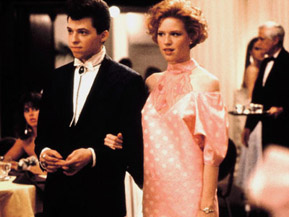|
|
Are You With Us?: Pretty in PinkBy Ryan MazieFebruary 27, 2012
While Hughes only produces and writes Pretty in Pink, his fingerprints can be seen all over the film. Directed by Howard Deutch (his resume reads like bad films of forgotten flops), Pretty in Pink is a pleasant and empty romp that falls mid-road amongst the countless reiterations of the plot. Pretty in Pink acted as a marker for many things. For one, it was the end of Ringwald’s leading lady career. Roger Ebert compared her to Elizabeth Taylor in his review for Pretty in Pink. Unfortunately, Hughes broke it off with Ringwald after she turned down a role he offered her in Some Kind of Wonderful. Unhappy with the ending of Pink, Hughes essentially remade the film as Wonderful and released it a year later. While hitting the mark with critics, it raked in less than half of Pink’s box office. As Hughes went on to success (minus Some Kind of Wonderful), Ringwald faltered without his guidance. Although getting leading roles, her next five major releases were trashed by critics and all failed to crack $20 million; some couldn’t even muster more than $10 million. By the ‘90s, Ringwald was all but written off. Pretty in Pink also signified the end of the Brat Pack. The next few films (with the exception of About Last Night…) were embarrassing flops that barely made more than the opening weekends of their earlier efforts. Although the weakest out of Candles and Breakfast, Pink still has redeeming factors - namely the soundtrack, which launched OMD's hit “If You Leave.” An eclectic mix of synth-pop, soul, and dance, I wished the movie was as risky as the tunes that it included. With Project X being a stark high school contrast to Pretty in Pink, this week’s film reminded me what was so special about the Hughes era of filmmaking – you didn’t need an R-rating to be a hit. There is something sweet about not needing to be raunchy. While this isn’t a knock against the hilarious Project X, it is my little PSA to studio heads that a movie can appeal to the teen-set without being whitewashed or laden with swears. Criticized for being unoriginal and slightly shoddy, there is a reason why this plot gets retold time after time – the story is just a relatable classic. With charismatic performances and being a part of a trio of films that elevates its status, Pretty in Pink is certainly with us. While Blane is suave and cool, Duckie is scattered and quirky. Being recycled countless times, Pretty in Pink isn’t the best version of this story, but it has its own characteristic charm with its idiosyncratic cast and side plots. So essentially, this film ended up being a Duckie; being loved for its awkward spots and not over polished values. Verdict: With us 7 out of 10
|

|
|
|

|
Friday, April 19, 2024
© 2024 Box Office Prophets, a division of One Of Us, Inc.


